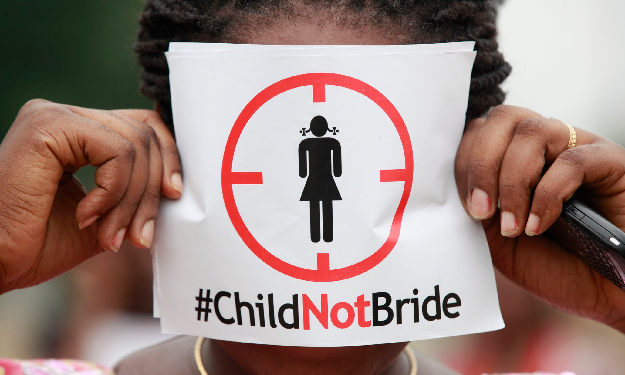BY NANA AISHA SALAUDEEN
Child marriage prevents teenagers from fornicating.
Child marriage is permissible as long as the child is mature and consents.
I rebel against the above statements that have become everyday debate points for the advocates of (forced) child marriage. The inbuilt prejudice of such assertions seem invisible to many of the participants – who overlook the damaging consequences that ascend from an under aged child being strained into marriage.
Advocates of such discussions typically throw in culture and religion to rationalize their arguments. The impression is that giving out girls from as early as the age of nine, for marriage generates a sense of security against sexual promiscuity and protection from sexually transferred infections. The child is to be precluded from being sexually active before marriage because marriage is a sacred union in which a female has to enter ‘pure’ i.e. a virgin – if she participates in sexual interactions before marriage she is wayward and brings humiliation to not only her family but her community as well.
Advertisement
The above perception, in practicality, is not only ridiculous but also similarly laughable as the girls tangled in the child marriage web tend to be married to much older partners who have had abundant sexual voyages; placing them at the peril of contracting sexually transmitted diseases like HIV/AIDS, Gonorrhea and Chlamydia than their married counterparts. Child brides are likely to feel, and in many cases, defenseless to refuse sex and disallowed the capability to make cognizant resolutions about sexual relations by their partners, this instinctively bolsters their inferiority status. At its vilest, it could be synonymous to enslavement or welded labour – exposing the child to domestic violence and creating a pathway to rape and other forms of sexual exploitation.
I’m in no way encouraging children to have multiple sexual associates before marriage but merely pointing out that a we-do-not-want-our-daughters-to-sleep-with-older-men-before-they-get-married-so-we-will-marry-them-off-early-to-older-men-who-will-then-sleep-with-them-instead approach is correspondingly inconsiderate and thoughtless.
Another argument repeatedly assumed by champions of child marriage is that of consent and maturity. The notion here is that the marriage is legitimate if the child concurs to being married off or if she has hit puberty. But, what does a 12 or 13-year-old know about consent? More than half of the time, the girls have little or no understanding and exposure to additional life alternatives and “voluntarily” accept marriage as their prearranged destiny. The family of the child, to advocate for her consent sometimes use a form of emotional/social force or intimidation. Marriage is a lifelong verdict that goes beyond merely attaining puberty and maturity. Such a decision should be made by an advanced mind and not a youngster that has barely made alterations between dolls and colouring books.
Consequently, the conception that maturity and puberty are only biological and fairy- tale prescriptions where a child goes to bed and suddenly wakes up able to handle adult roles together with the responsibility of marriage is insane and reckless.
Advertisement
When a girl is married as a child, she cannot make the choice of when to give birth. Society impels her to start birthing at such a tender age notwithstanding that she is mentally and physically unprepared for reproduction. A pregnancy too premature before a female body is completely developed is a danger for both the mother and baby. Therefore, complexities may result from pregnancy and childbirth, which happen to be the major cause of death among females below the age of 19 in Nigeria. Among the health risks associated with child marriage is Vesico Vaginal Fistula (VVF), a gynecological problem that occurs when the blood supply to the tissues of the vagina and bladder is restricted during prolonged/obstructed labour. It is sparked in young girls with bodily immaturity where the pelvis and birth canal are not effusively developed.
According to the Women’s right watch, Nigeria has the highest prevalence of VVF in the world with 800,000 women with an average of 500,000 reported cases originating from early marriage.
The constitution of Nigeria does not plainly postulate a minimum age for marriage, however, the child’s right act, sets the age of marriage at 18 years old. Notwithstanding the law being sanctioned since 2003, barely 23 of Nigeria’s 36 states have appropriated distinct steps to implement the minimum marriage age. I’m of the opinion that enactment of laws alone will not end the practice as many families and communities see child marriage as an intensely entrenched custom, which has been part of their culture for generations. For alteration of the practice to materialize, the values and customs that support the practice of child marriage need to change. Communal level adjustment reinforces efforts in minimizing child marriage and moderating the damaging effects for married girls. Without a change at this level, the day-to-day reality for girls in Nigeria will stay unchanged. It is therefore fundamental to work with families and the larger community to foster consciousness on the wounding consequences of child marriage so as to drive approval among those who make the decision to marry girls as children to the minimal. It is additionally imperative to involve religious and traditional leaders that play key roles in decision making or influencing prevailing norms in communities to speak on the hazards of child marriage.
Asides community members and local leaders, there is need for federal and state governments to snowball access to reachable, high quality and secure schooling to ensure married girls have the chance to complete their education and child marriage is minimized. Education shapes knowledge, unlocks new prospects and can change customs around the values of females in the community. The very act of girls joining school can demonstrate to the community that girls of school-going age are still children. While keeping girls in school is an effective way of preventing early marriage it is not enough. Girls need the backing to make the shift into secondary school. For married girls, it is important that schools encourage and support them to continue their education in either an informal or formal setting such as being part of a safe space program undertaking part-time, remote or vocational learning.
Advertisement
Nigerians, for the sake of posterity, need to speak against the absurdity that is child marriage and its proponents – as they have undeniably stripped many young girls of their childhood, dreams, health and basic human rights.
Nana is an economist and accountant with a passion for activism.
Views expressed by contributors are strictly personal and not of TheCable.
Add a comment






